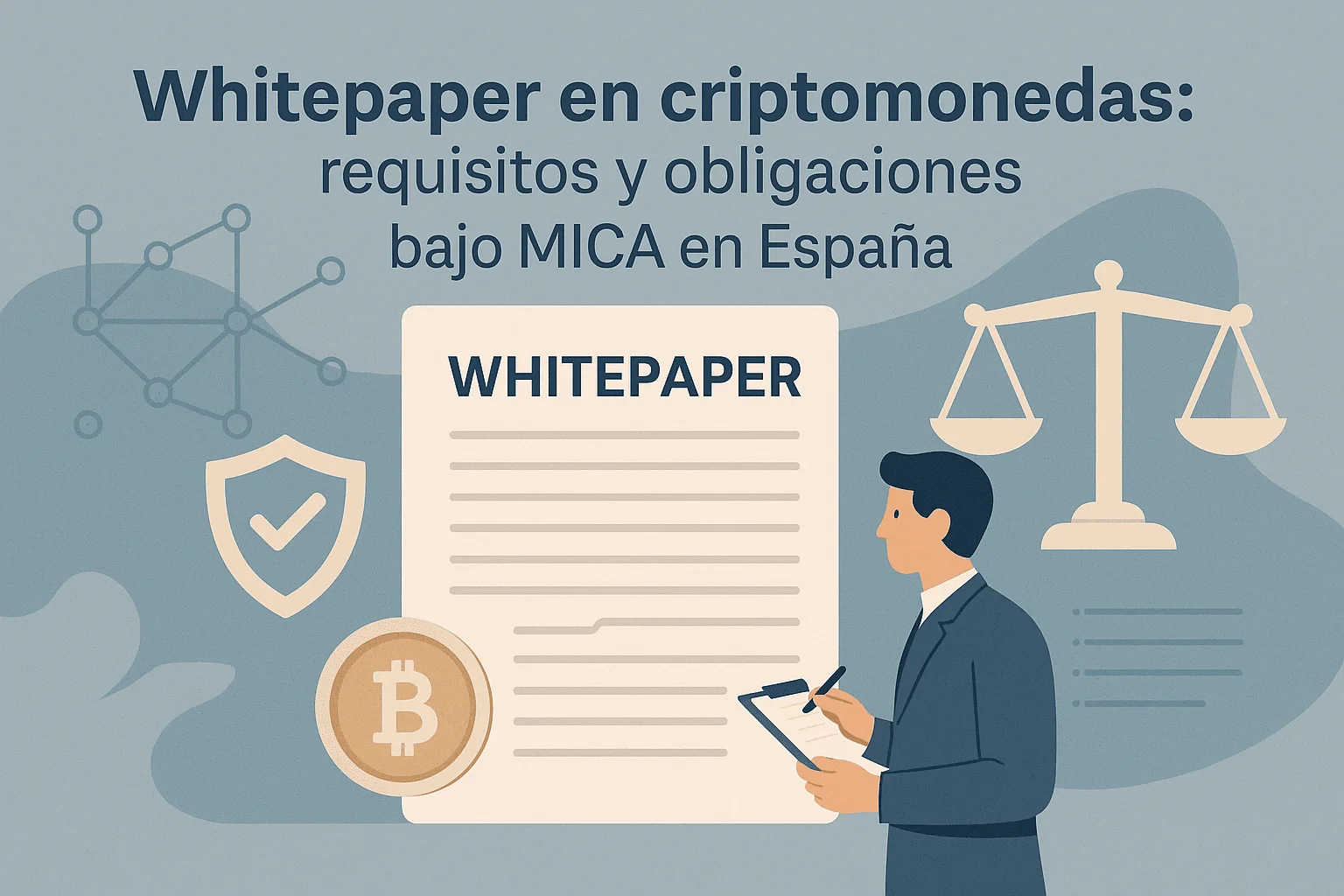Investment Funds in Crypto-Assets in Spain: Limits, Regulation, and Viability
A demanding regulatory environment
Spain has an especially strict legal framework for the creation and operation of collective investment institutions. Both Law 35/2003 on Collective Investment Institutions and its implementing Regulation (RD 1082/2012) impose technical, financial, and documentary requirements that make it difficult for new operators to enter the market — especially when seeking to innovate with digital assets.
The establishment of a traditional investment fund requires:
- A specific corporate structure (generally a public limited company).
- Minimum capital of €2,400,000.
- Authorization from the CNMV.
- Preparation of an information prospectus.
- Involvement of a management company, financial advisor (EAF), auditor, and legal counsel, among others.
These requirements represent genuine entry barriers, reserved almost exclusively for entities with significant financial capacity and prior experience.
Is it possible to create funds with exposure to crypto-assets?
Although the CNMV has maintained a conservative stance, there is no outright prohibition on all crypto-asset exposure within funds. The official position was set out in the “Questions and Answers on Crypto-Assets” published in May 2022.
UCITS or quasi-UCITS funds
Traditional harmonized funds (UCITS) may have some indirect exposure to crypto-assets, provided that:
- It is through “Delta One” derivatives, such as ETFs or ETCs that replicate the performance of a crypto index or asset.
- There are clear exposure limits, which may never exceed 20% of the fund’s assets.
Investment is also permitted in securities issued by companies whose business activity is related to crypto-assets — such as technology platforms or issuers of blockchain-based structured products.
👉 In no case is direct ownership of cryptocurrencies allowed in UCITS funds.
What alternatives exist for a crypto-focused fund?
Since the UCITS model does not allow direct exposure, alternatives involve using different vehicles, such as venture capital entities (ECR) or closed-end collective investment companies (SICC).
Venture Capital Entities (ECR)
Under Law 22/2014 and its implementing regulations, ECRs allow investment in innovative projects, including blockchain technology or digital assets. However:
- Only professional or qualified investors may participate.
- They are not available to the general public.
- They require authorization and supervision by the CNMV.
Closed-End Collective Investment Companies (SICC)
SICCs, also regulated under Law 22/2014, offer some additional flexibility:
- They require a lower initial minimum capital.
- They allow direct capital contributions from partners.
- They permit investments in illiquid or non-traditional assets.
Nevertheless, they are also subject to significant restrictions:
- They must have a registered manager.
- Partners must meet professional investor criteria.
- They are not exempt from accounting, audit, and reporting obligations.
Legal and tax challenges
Even when opting for alternative structures, the absence of specific regulation for crypto-focused funds creates legal uncertainty. The following factors must be taken into account:
- Lack of an express definition of crypto funds in Spanish law.
- Potential restrictive interpretations by the CNMV.
- Risk of legal reclassification and sanctions for unauthorized activities.
- Complex taxation, particularly concerning asset valuation and taxable events.
What does the new Securities Markets Law say?
Law 6/2023, on Securities Markets and Investment Services, has taken certain steps toward incorporating DLT and crypto-assets into the traditional financial framework. However, it does not directly regulate the creation of cryptocurrency investment funds. It merely:
- Includes references to crypto-assets as financial instruments (when applicable).
- Adapts supervisory rules to new technologies.
In the short term, there appears to be no plan for broad regulatory liberalization. Still, there are signs of gradual integration.
Conclusion: Is there a future for crypto funds in Spain?
Currently, it is not viable to create a public investment fund with direct exposure to cryptocurrencies in Spain. The only possible options are:
- UCITS funds with limited, indirect exposure.
- ECR or SICC vehicles aimed at professional investors.
Legal uncertainty remains high, and the regulatory burden considerable. Nevertheless, signs of progress are emerging — especially following the new Securities Markets Law and European developments on crypto-asset integration.
Although Spain is not leading financial innovation, regulatory evolution may allow specialized funds to enter the market in the medium term, provided that system stability and investor protection are maintained.
Frequently asked questions about crypto-asset investment funds in Spain
Can investment funds that invest directly in cryptocurrencies be created in Spain?
No. In Spain, UCITS funds and collective investment institutions cannot have direct exposure to crypto-assets, as reiterated by the CNMV. Only indirect exposure through financial instruments (ETFs, ETCs, index funds) is permitted, always within established limits.
Is there any legal structure that allows for a true crypto fund?
Yes, but with limitations. The viable legal alternatives are:
- Venture Capital Entities (ECR).
- Closed-End Collective Investment Companies (SICC).
Both are restricted to professional investors and are not accessible to retail investors.
Does the reform of the Securities Markets Law allow tokenization of investment funds?
No. Law 6/2023, of March 17, introduced significant advances regarding DLT technology, but the tokenization of investment funds as such is not yet permitted.
What the law does allow is:
- The issuance and registration of negotiable securities (shares, bonds, etc.) using distributed ledger technology (DLT).
- Participation in the European DLT Pilot Regime, regulated by Regulation (EU) 2022/858, which allows controlled operation of tokenized secondary markets.
However, this authorization does not extend to collective investment institutions such as investment funds, which remain subject to their own regulatory frameworks and have not yet been included in the tokenization allowed under the Securities Markets Law.
Can SICAVs or traditional funds invest in companies linked to blockchain?
Yes. Traditional institutions can invest in shares or securities issued by technology companies related to blockchain or crypto-assets, provided they comply with general diversification and exposure rules of the fund.
What is the maximum allowed exposure to crypto-assets in traditional funds?
Through indirect financial instruments, the CNMV has allowed exposures of up to 20% of the fund’s value, but only if the product...



